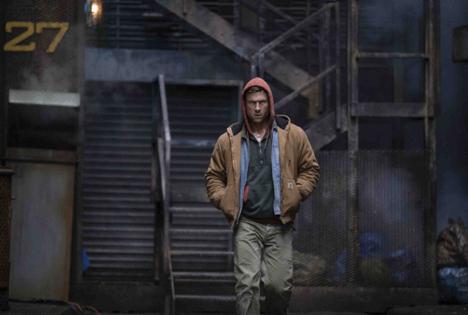Movie review: 'The Running Man' a dystopian satire sprinting at full speed
Published in Entertainment News
Why walk when you can run? The second Stephen King adaptation about a contest to the death for a large cash prize has hit theaters this fall — Edgar Wright’s take on “The Running Man,” which was published in 1982 under King’s pen name Richard Bachman. Also included in the 1985 collection “The Bachman Books” is “The Long Walk,” about a group of teenage boys taking part in a televised walk or die competition. That grim film adaptation, directed by Francis Lawrence, of “The Hunger Games,” debuted in September, but hot on their heels comes our man on the run, breathless, brutal and bloody.
It’s in fact his second lap. In 1987, Paul Michael Glaser directed a version of this dystopian media satire starring Arnold Schwarzenegger, set in 2017, but Wright’s version, written with Michael Bacall, and set in 2025 (as the book is), hews much closer to the novel than Glaser’s film. A beefed-up Glen Powell plays Ben Richards, a desperate man who has been blacklisted from his job after informing a union rep about radiation exposure in his workplace, and now has no choice but to audition for a dangerous game show while trying to protect and provide for his wife (Jayme Lawson) and sick daughter, Cathy.
The most popular program of the state-run media, “The Running Man” TV show is produced by devious executive Killian (Josh Brolin) and hosted by smarmy showman Bobby T (Colman Domingo). The contest is a 30-day affair in which three contestants have to try to outrun, outlast and evade a team of murderous Hunters, led by the masked McCone (Lee Pace).
They become enemies of the state, with citizens encouraged to report any sightings, hunted on all sides while mailing videotapes every day. While his compatriots, the hedonistic Laughlin (Katy O’Brian, Powell’s former “Twisters” teammate) and hapless Jansky (Martin Herlihy) are obvious chum, Ben’s physical skills, honed on the job, and righteous anger, instilled in him by the injustices of the fascist authoritarian government the Network, make him an ideal candidate for “The Running Man.” Ben is mad as hell and he’s not going to take it anymore.
Let’s be honest: it is deeply ironic that Wright’s “The Running Man” is among the first of Paramount’s high-profile film releases under the ownership of David Ellison, the scion of a tech billionaire who embraces right-wing politics and is seeking to create his own media monopoly, contemplating a purchase of Warner Bros. too. Wright and Bacall’s script is utterly savage in its critique of a fascist state media that turns broadcast bloodshed into propaganda in order to keep poor people at each other’s throats and away from the guillotine. The messaging isn’t subtle or even nuanced as it illustrates how these exploitative game shows disrupt class solidarity by villainizing participants, and that the other television offerings, like a Kardashians-style show called “The Americanos” is an opiate for the masses that only leaves them wanting more.
From storytelling to style, “The Running Man” delivers with a sledgehammer, not a scalpel. Both Wright and Powell are grittier, meaner, more unhinged than we’ve seen from a filmmaker and star known for their cheeky charm. At times it does feel as though both are posturing at toughness, teeth bared, but it’s fun to see them go just a little mad sometimes.
For Powell’s Ben, his motivations are rooted in family, which is more emotional than Schwarzenegger’s performance, and more suited to Powell’s natural screen abilities — he’s less murdering machine than Schwarzenegger, more (shockingly ripped) sad dad. Ben might be a little slow on his awakening about how he’s being manipulated in the game, but he figures it out soon enough.
Wright’s own agenda is made manifest with every helper that Ben finds along his journey — from an old friend (William H. Macy), who helps him gear up for the quest, to an underground activist in Boston, to a radical organizer in Maine (Michael Cera) — Wright makes an argument for the importance of physical media, an offline technology that doesn’t “watch you back” in the Network’s surveillance state, and for media literacy, to understand the video manipulation that the Network engages in to misrepresent the contestants on “The Running Man.” Their tools of liberation are public access TV shows, VHS tapes and photocopied zines.
Wright makes the argument that in such a dystopian, fascist state, there are only a few things that will save us: class solidarity, physical media and literacy. It’s a powerful and potent message that cuts through any and all of the bombastic busyness of “The Running Man.” The only question that remains is: has David Ellison watched the movie his studio is releasing? It could be vastly illuminating.
———
‘THE RUNNING MAN’
3 stars (out of 4)
MPA rating: R (for strong violence, some gore, and language)
Running time: 2:13
How to watch: In theaters Nov. 14
———
©2025 Tribune Content Agency, LLC













Comments